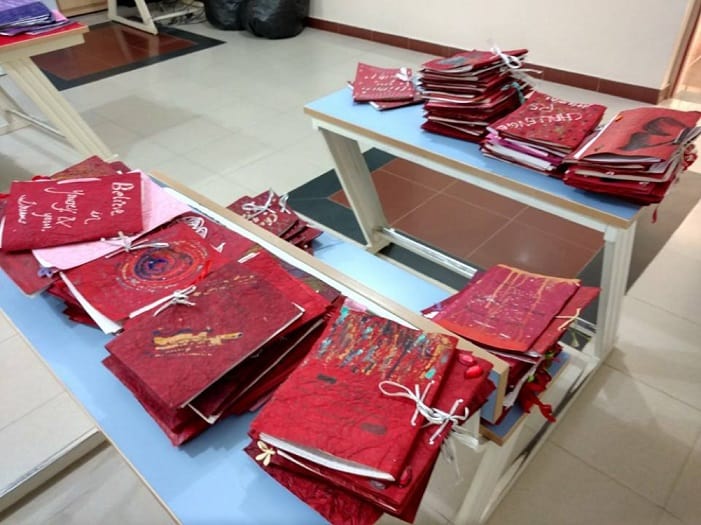Nishant Panicker and Aniruddah Vorunganti are the kind of people who cannot but leave you thoroughly impressed. Aniruddah studies medicine at Oxford university, whilst Nishant studies biology in Bengaluru and is also a skilled Hindustani music practitioner. Most impressive of all, however, is the initiative they started when they were still just school boys: “TAGE – Towards a Green Education”.
The two 18-year-olds, while studying in National Public School in Bengaluru, developed a “school-pairs” model that allows an exchange between donor and recipient schools to provide and share resources such as notebooks and other stationery. So far, they have collected around 8 tonnes of paper, and given stationery to approximately 800 students!
A remarkable track record and yet, they are very down to earth. We talk about universities and the stereotypical gap year student. Then our conversation shifts to the topic of their venture, which they are only too happy to discuss. The idea to start TAGE began when they saw just how much paper was being wasted in their classrooms, and were looking for a way to fill up the free time they had at the end of tenth grade.
For two months after their exams, there was nothing to do. The students would just sit in class the entire day and talk. “Most of the time we were talking about complete nonsense, but then on one such occasion we ended up talking about something useful,” they reminisce.
Nishant and Aniruddah began by collecting paper, at first collecting only 30 kilos. To make this more effective, they incentivised their classmates by organising inter-house competitions in their school. “Of course when there’s a competition, people get more involved. So we got significantly more paper after that competition, and that’s when it all really started.”
That, however, was not enough. “We wanted to go and do something bigger…we thought, we should spread to as many schools as we can. And so if you think about it, if there are 200 schools like ours, with just a thousand students working towards our cause in each school, then that’s already 200,000 students working on making notebooks and collecting paper. We felt that kind of scale is unprecedented and the potential to make a difference is incredible,” say the inspired duo.
Establishing TAGE, however, has not been the easiest of tasks. The work is volunteer-based. “You need to keep sending reminders. You don’t get weekly updates about what’s happening. You get updates only every two-months.”
To gain more authority, Nishant and Aniruddah are now looking to register TAGE as an NGO. When you look at Aniruddah’s determined face and the passion these boys have for their project, their vision seems entirely possible. They have already spoken to several other schools and enlisted their cooperation.
Another aspect TAGE addresses is the importance to establish a network between schools. When a donor school is partnered with a recipient school, the first step is for the students to meet and understand the needs of the other school. Then they can brainstorm on a solution, and efficiently address the problems they are facing. And this is not simply limited to giving aid.
Aniruddah recognises that lack of cooperation between schools is a common issue. “In India, there’s not much communication between schools, especially those at different ends of the economic spectrum. And that’s not a good thing. I think all students across the world should connect in some way. I think TAGE has the potential to be a bridge between students from every class of society, every student in Bangalore should be able to be a part of TAGE. And so everyone works towards solving the problems of society. Eventually, when all the students don’t have any problems anymore, they’ll be solving bigger problems.”
In the future, the TAGE founders want to establish a network called “Students for Students”, that will also cover teaching, for instance by incorporating multimedia so students globally can aid each other. As Nishant puts it, the goal is “(To attain a state where) it’s not my organisation, it’s not his organisation. That it’s just this thing, this system that everybody follows. That it’s just become a part of society. It’s just associated with all students. And there’s no credit. Credit is due to all, anybody. Everybody does work for everybody else, everybody works alongside everybody.”
If their vision is realised, it would bring about a world in which all students help each other – as a student myself, this sounds like a world I would quite like to live in.
[This article is in continuation of our series on the Ashoka Youth Venture Programme, a global initiative led by Ashoka which recognises many such inspiring teenagers across the world. The Youth Venture Programme works to empower teenagers with passion, commitment and great ideas.]
